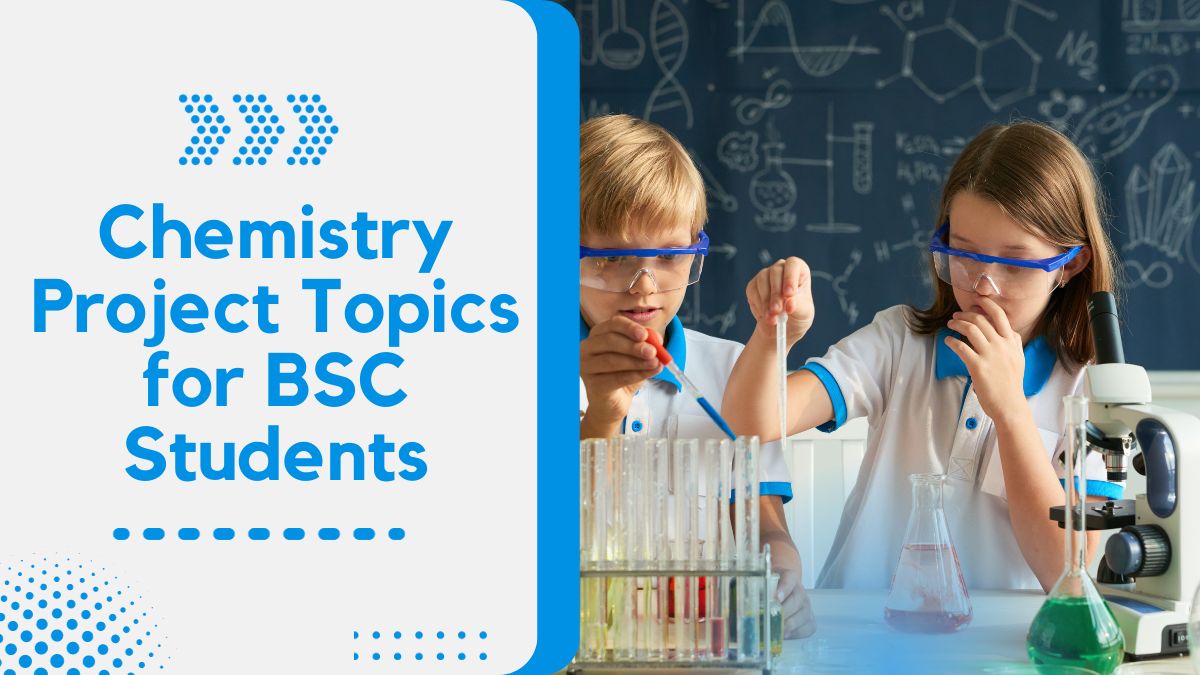Explore a comprehensive list of chemistry project topics for BSC students. Enhance your knowledge and excel in your academic pursuits.
Welcome to the captivating world of chemistry! For Bachelor of Science (BSC) students, the journey through the diverse landscapes of chemical science is an exciting adventure.
Central to this journey are chemistry projects—opportunities for hands-on exploration, experimentation, and discovery.
Yet, the secret to a truly rewarding project lies in the choice of the right topic—one that not only aligns with academic goals but also stirs up genuine curiosity and enthusiasm.
In this article, we’re about to embark on an inspiring quest through a specially curated list of chemistry project topics, tailor-made for BSC students like you.
These topics promise not only to enhance your academic journey but also to kindle your passion for the captivating world of chemistry.
So, let’s dive in and explore the boundless possibilities and wonders that await in the realm of chemistry projects!
What is Chemistry Project Topics?
Chemistry, often dubbed the central science, has its fingerprints on virtually every facet of our lives. It’s the hidden force behind the scents we love, the reactions that fuel our cars, and even the medicines that keep us healthy.
Now, suppose this: BSC students are at the forefront of this captivating science, armed with a unique chance to dive headfirst into its various branches through project work.
These projects aren’t just your run-of-the-mill assignments; they’re like scientific adventures.
They do much more than boost your knowledge; they’re contributions to the grand tapestry of scientific discovery. So, imagine being part of this world, where you not only learn but also shape the future of chemistry!
The Importance of Choosing the Right Chemistry Project
Have a close look at the importance of choosing the right chemistry project:-
Personal Engagement
A well-suited project captures your interest and keeps you engaged throughout, making your academic journey more enjoyable.
Relevance
It should align with your coursework and academic goals, ensuring that your efforts contribute meaningfully to your education.
Contribution
Choosing the right project means you’re not just benefiting yourself; you’re also adding to the body of scientific knowledge and benefiting the broader scientific community.
Skill Development
The right project challenges you, helping you acquire and refine valuable skills essential for your academic and professional growth.
Passion
When you’re passionate about your project, it transforms the work into a thrilling journey filled with curiosity, discovery, and enthusiasm.
In summary, the importance of selecting the right chemistry project goes beyond academics; it influences your engagement, relevance, contribution, skill development, and passion, enriching your scientific experience and personal growth.
Chemistry Project Topics for BSC Students
Here are Chemistry Project Topics for BSC Students:-
Organic Chemistry Projects
- Synthesis of Aspirin: Investigate the synthesis process, purity, and properties of this widely used pain reliever.
- Extraction of Natural Pigments: Explore the extraction of pigments from various plants and assess their applications in dyes and cosmetics.
- Analysis of Essential Oils: Analyze the chemical composition of essential oils from different sources and study their potential medicinal properties.
- Green Chemistry: Investigate environmentally friendly synthesis methods and processes in organic chemistry.
- Organic Synthesis of Pharmaceuticals: Design and synthesize organic compounds with potential pharmaceutical applications.
- Study of Aromatic Compounds: Explore the properties and reactions of aromatic compounds, such as benzene and its derivatives.
- Polymer Chemistry: Investigate the synthesis and properties of polymers, including their applications in various industries.
- Organic Chemistry of Natural Products: Analyze the chemical makeup of natural products like alkaloids, terpenes, and flavonoids.
- Organometallic Chemistry: Study the bonding and reactivity of compounds containing metal-carbon bonds.
- Organic Photochemistry: Explore the effects of light on organic compounds and their photochemical reactions.
Inorganic Chemistry Projects
- Synthesis of Metal Complexes: Investigate the preparation and characterization of metal complexes with ligands of varying structures.
- Coordination Chemistry: Explore the coordination behavior of transition metal ions with different ligands.
- Inorganic Synthesis of Nanoparticles: Synthesize and characterize metal or metal oxide nanoparticles with potential applications in catalysis or nanotechnology.
- Study of Lanthanides and Actinides: Investigate the properties and applications of lanthanide and actinide series elements.
- Inorganic Reaction Mechanisms: Analyze the reaction mechanisms of various inorganic reactions, such as redox reactions or ligand substitution reactions.
- Organometallic Synthesis: Study the synthesis and reactivity of organometallic compounds containing metal-carbon bonds.
- Bioinorganic Chemistry: Explore the role of metal ions in biological systems and their significance in biochemical processes.
- Main Group Chemistry: Investigate the chemistry of main group elements and their compounds.
- Inorganic Synthesis of Coordination Polymers: Synthesize and characterize coordination polymers with unique structures and properties.
- Supramolecular Chemistry: Study non-covalent interactions in inorganic chemistry, such as host-guest complexes and molecular recognition.
Physical Chemistry Projects
- Chemical Kinetics: Investigate the rate of chemical reactions under different conditions and analyze reaction mechanisms.
- Electrochemistry: Explore the principles of electrochemical cells, study electrode processes, and investigate applications in energy storage.
- Thermodynamics of Reactions: Study the thermodynamic parameters of chemical reactions, including enthalpy, entropy, and Gibbs free energy.
- Quantum Chemistry: Apply quantum mechanical principles to predict molecular structures and electronic properties of chemical compounds.
- Statistical Mechanics: Explore the statistical behavior of particles in systems, including the Boltzmann distribution and partition functions.
- Surface Chemistry: Investigate the physical and chemical properties of surfaces and interfaces, including adsorption and catalysis.
- Chemical Thermodynamics: Study the thermodynamic properties of chemical systems and phase equilibria.
- Spectroscopy and Molecular Structure: Analyze the interaction of matter with electromagnetic radiation and determine molecular structures.
- Chemical Equilibrium: Investigate chemical equilibrium and the factors that influence it in various chemical reactions.
- Photochemistry: Explore the effects of light on chemical reactions, including photochemical mechanisms and applications.
These diverse project topics encompass a wide range of subfields within chemistry, offering BSC students opportunities for hands-on exploration and research in their chosen area of interest.
How to Select the Ideal Chemistry Project Topic?
Selecting the ideal chemistry project topic is a crucial step that can significantly impact your academic journey and research experience. Here’s a guide on how to make the right choice:
Personal Interest
Start by considering your personal interests within the field of chemistry. What topics or areas intrigue you the most? Projects aligned with your passions are more likely to keep you motivated and engaged throughout.
Academic Alignment
Ensure that the chosen topic aligns with your coursework and academic goals. It should complement your studies and contribute to your overall understanding of chemistry.
Research Existing Knowledge
Before finalizing a topic, research existing literature and studies in that area. Understanding what has already been explored can help you identify gaps in knowledge or areas where further investigation is needed.
Consult with Professors
Seek guidance from your professors or mentors. They can provide valuable insights into potential project topics, offer suggestions, and help you refine your ideas.
Available Resources
Consider the resources available to you, including laboratory equipment, chemicals, and access to research materials. Ensure that your chosen project is feasible within your academic environment.
Scope and Complexity
Assess the scope and complexity of the project. It should be challenging enough to stimulate your intellectual growth but not so complex that it becomes unmanageable.
Relevance and Impact
Think about the broader relevance and potential impact of your project. How does it contribute to the field of chemistry or address real-world issues? Projects with practical applications or scientific significance can be particularly rewarding.
Feasibility
Evaluate the feasibility of your project in terms of time, budget, and available support. Ensure that you have a clear plan for conducting experiments and gathering data.
Ethical Considerations
Be aware of any ethical considerations related to your project, especially if it involves human subjects, animals, or hazardous materials. Ensure that your research adheres to ethical guidelines.
Flexibility
Keep some degree of flexibility in your project plan. Research may take unexpected turns, and being adaptable can help you navigate challenges and make the most of unexpected discoveries.
Passion and Curiosity
Choose a topic that genuinely excites your curiosity. A project driven by passion often leads to more enthusiastic and successful research.
Peer Feedback
Discuss your ideas with peers or fellow students. Their perspectives and feedback can offer valuable insights and help you refine your project concept.
By carefully considering these factors and conducting thorough research, you can select an ideal chemistry project topic that not only aligns with your interests and academic goals but also offers a rewarding and enriching research experience.
Tips for Successful Project Execution
Have a close look at the tips for successful project execution:-
Detailed Planning
Start with a well-structured project plan. Define your objectives, set clear goals, and create a timeline outlining each phase of your project.
Research Extensively
Before conducting experiments, thoroughly research the relevant literature to understand existing knowledge and methodologies related to your topic.
Lab Safety
Prioritize safety at all times. Familiarize yourself with safety protocols, wear appropriate protective gear, and handle chemicals and equipment with care.
Experimental Design
Design your experiments carefully, considering variables, controls, and potential sources of error. Consult with professors or advisors for input on your experimental setup.
Data Collection
Maintain accurate and organized records of your experiments, including measurements, observations, and any unexpected results.
Analytical Tools
Utilize appropriate analytical tools and techniques for data analysis. This may involve statistical analysis, spectroscopy, chromatography, or other methods depending on your project.
Troubleshooting
Be prepared to encounter challenges during experiments. Develop problem-solving skills and seek guidance from mentors or colleagues when needed.
Regular Updates
Keep your professors or advisors informed of your progress. Regular meetings can provide valuable feedback and help you stay on track.
Documentation
Create a detailed laboratory notebook or digital records that document your procedures, results, and any modifications made during the project.
Data Interpretation
Analyze your data critically and draw meaningful conclusions. Discuss your findings with mentors and peers to gain different perspectives.
Adaptability
Be flexible in your approach. If your initial experiments do not yield the expected results, be open to adjusting your methods or hypotheses.
Time Management
Manage your time effectively to meet project milestones and deadlines. Avoid procrastination and allocate sufficient time for analysis and report writing.
Communication Skills
Develop strong communication skills to convey your research findings clearly and effectively, both in written reports and oral presentations.
Collaboration
Collaborate with colleagues or fellow students when applicable. Sharing ideas and resources can enhance the quality of your research.
Continuous Learning
Stay updated with the latest developments in your field through scientific journals, conferences, and discussions with experts.
Ethical Conduct
Adhere to ethical guidelines and principles in your research. Ensure that your work is conducted with integrity and honesty.
Feedback Incorporation
Embrace constructive feedback from mentors, peers, or reviewers, and use it to improve your project and research skills.
Celebrate Milestones
Acknowledge and celebrate your achievements and milestones throughout the project. It can boost motivation and morale.
Stay Organized
Maintain a well-organized workspace and records. A tidy and systematic approach can save time and prevent errors.
Reflect and Learn
After completing your project, reflect on your experiences and lessons learned. Consider how you can apply these insights to future research endeavors.
By following these tips and maintaining a dedicated and systematic approach, you can enhance the chances of successful project execution in the field of chemistry.
Benefits of Chemistry Projects for BSC Students
Certainly, here are the benefits of chemistry projects for BSC (Bachelor of Science) students:
Hands-On Experience
Chemistry projects provide students with practical, hands-on experience in conducting experiments, handling chemicals, and using laboratory equipment. This experience is invaluable for future careers in science.
Deeper Understanding
Engaging in research projects allows students to delve deeper into specific areas of chemistry, gaining a more profound understanding of concepts and theories.
Problem-Solving Skills
Projects often involve troubleshooting and problem-solving, honing students’ critical thinking and analytical skills. They learn to overcome challenges and adapt their approaches.
Skill Development
BSC students acquire a wide range of laboratory and research skills, including data collection, analysis, and interpretation. These skills are transferable and valuable in various scientific fields.
Research Ethics
Students learn about research ethics, including responsible conduct and the importance of integrity in scientific inquiry.
Scientific Method
Projects follow the scientific method, teaching students how to formulate hypotheses, design experiments, and draw conclusions based on evidence.
Innovation
Encouragement to explore unique topics fosters creativity and innovation. Students may discover new approaches or solutions to existing problems.
Interdisciplinary Learning
Chemistry projects often intersect with other scientific disciplines, providing opportunities for interdisciplinary learning and collaboration.
Publication and Presentation
Successful projects can lead to publications or presentations at conferences, enhancing students’ academic and professional portfolios.
Career Preparation
The skills and experiences gained from chemistry projects prepare students for careers in research, academia, industry, or healthcare.
Increased Confidence
Completing a project independently or as part of a team boosts students’ confidence in their abilities to tackle complex scientific challenges.
Networking
Projects often involve interaction with professors, mentors, and peers, helping students build a professional network within the scientific community.
Resume Enhancement
A well-executed project can serve as a strong addition to a student’s resume or graduate school application, setting them apart from their peers.
Real-World Applications
Many chemistry projects have real-world applications, allowing students to see the practical relevance of their studies.
Contributions to Knowledge
Students may make meaningful contributions to the field of chemistry by generating new data, theories, or insights.
Personal Fulfillment
Successfully completing a challenging project can provide a sense of personal fulfillment and accomplishment.
Preparation for Advanced Degrees
For those considering postgraduate studies, chemistry projects provide valuable research experience and strengthen applications for advanced degrees.
Critical Evaluation
Students learn to critically evaluate existing literature and research, improving their ability to assess scientific claims and findings.
Teamwork and Leadership
Collaborative projects enhance teamwork and leadership skills, important attributes for any career path.
Life-Long Learning: Engaging in research projects fosters a love for learning and encourages students to continue exploring and discovering throughout their careers.
What is the best topic for chemistry project?
Selecting the right chemistry project topic is crucial for a successful project. The ideal topic should align with your interests, offer access to ample research materials, and be suitable for your skill level and experience.
Here are some ideas to consider for chemistry projects:
Chemical Composition Analysis
Investigate the chemical composition of a commonly used household product. This can provide insights into the ingredients and their properties.
Factors Affecting Chemical Reactions
Explore how various factors, such as temperature or pH levels, impact a chemical reaction. This research can reveal the variables influencing reaction outcomes.
Innovative Compound Synthesis
Develop a novel method for synthesizing a chemical compound. This project offers an opportunity to innovate and create something new.
Material Properties Study
Study the properties of a recently discovered material. This can involve characterizing its physical, chemical, and structural attributes.
Experimental Hypothesis Testing
Design and conduct an experiment to test a scientific hypothesis related to chemistry. This approach allows you to apply the scientific method.
If you find yourself unsure about the right topic, consider seeking suggestions from your teacher or browsing the internet for a wealth of chemistry project ideas.
Remember, the key is to choose a topic that sparks your curiosity and aligns with your abilities, ensuring a rewarding and successful project.
What are hot topics in chemistry?
In the realm of chemistry, 2023 brings forth some scintillating and cutting-edge areas of research:
Sustainable Chemistry
With a laser focus on eco-friendliness, sustainable chemistry aims to birth cleaner chemical processes and products. Think novel catalysts for green energy, inventive techniques for recycling and waste reduction, and biodegradable, non-toxic materials.
Materials Science
This arena is all about crafting and scrutinizing new materials, from polymers to metals, ceramics, and composites. Researchers are fashioning materials for advanced batteries, solar cells, medical devices, and robust, lightweight structural applications.
Biochemistry
At the intersection of chemistry and life itself, biochemistry explores the intricate chemistry of living organisms.
Dive into the study of proteins and enzymes, the development of groundbreaking drugs and therapies, and the engineering of microorganisms to yield valuable products.
Quantum Chemistry
The captivating fusion of quantum mechanics and chemistry gives birth to groundbreaking methods for simulating and predicting molecular properties. Think about the design and synthesis of new materials and the rise of quantum computing.
Artificial Intelligence (AI)
AI’s infusion into the chemistry landscape is revolutionary. It’s shaping the development of next-gen drugs that are both potent and gentle, as well as the creation of robust, lightweight materials.
Moreover, AI is predicting chemical reaction outcomes, optimizing processes, and pushing the boundaries of innovation.
These are just a glimpse into the dynamic world of chemistry research in 2023. It’s a vast and swiftly evolving domain, teeming with opportunities for groundbreaking discoveries and scientific progress.
What is an example of a chemistry topic?
A chemistry topic worth exploring is the impact of temperature on chemical reaction rates. This intriguing area can be probed through experimentation.
Imagine having two identical sets of reactants, each subjected to different temperatures, with the reaction rate meticulously measured at each temperature point.
The data collected can then be plotted on a graph, revealing the relationship between reaction rate and temperature.
This graphical representation can unveil critical insights, including the activation energy of the reaction and how the reaction rate fluctuates at varying temperatures.
Another captivating chemistry topic involves the synthesis of aspirin, a widely used pain reliever. Aspirin can be created through the reaction of acetic anhydride and salicylic acid.
Delving into this process entails carefully combining the two reactants in precise proportions and subjecting them to specific conditions.
The resulting product can then undergo purification and rigorous analysis to ascertain its purity and identity.
These examples merely scratch the surface of the diverse world of chemistry topics. The field encompasses an array of areas ripe for exploration, such as:
- Unraveling the mysteries of matter’s structure and properties.
- Exploring the intricacies of chemical bonding.
- Unearthing the mechanisms behind chemical reactions.
- Probing the fascinating realms of thermodynamics and kinetics.
- Delving into the electrifying world of electrochemistry.
- Mastering the art of analytical chemistry.
- Navigating the intricate pathways of organic and inorganic chemistry.
- Investigating the physical forces that drive chemical phenomena.
- Exploring the chemistry of life itself through biochemistry.
The specific chemistry topic you choose to explore should align with your interests and objectives. If you’re keen on delving deeper into a particular facet of chemistry, consider perusing research papers, articles, and discussions on the subject.
Engaging with your teacher or a knowledgeable chemistry professor can also provide valuable guidance and suggestions.
Which is the best project in MSC chemistry?
Selecting the perfect M.Sc. chemistry project is a crucial step in your academic journey. It should both captivate your interest and pose a satisfying challenge.
Equally important is the feasibility of completing the project within the confines of your program’s time constraints.
Consider these ideas for M.Sc. chemistry projects:
Innovative Compound Synthesis
Embark on the creation of a groundbreaking method for synthesizing a chemical compound, pushing the boundaries of chemical innovation.
Material Exploration
Dive into the study of a novel material’s properties, shedding light on its characteristics and potential applications.
Experimental Hypothesis Testing
Design and execute experiments aimed at testing scientific hypotheses, employing meticulous methods and precise data analysis.
Factors Shaping Reactions
Investigate the intricate dance of different factors, such as temperature or pH levels, on the outcomes of chemical reactions, revealing the secrets of chemical kinetics.
Complex Sample Analysis
Analyze the intricate chemical composition of complex samples like plant extracts or biological fluids, offering insights into the mysteries of nature.
Analytical Advancements
Pave the way for cutting-edge analytical methods capable of detecting or quantifying specific chemical compounds with precision.
Therapeutic Innovation
Design and synthesize a new pharmaceutical or therapeutic agent, potentially impacting healthcare and medicine.
Molecular Insights
Delve deep into the molecular mechanisms underlying biological processes like photosynthesis or cell signaling, unraveling nature’s secrets.
Computational Chemistry
Forge new frontiers in computational chemistry by developing methods to predict the properties of molecules or materials.
Environmental Impact Assessment
Scrutinize the environmental consequences of chemicals or chemical processes, contributing to sustainability efforts.
Sustainable Chemistry
Champion sustainability by crafting novel chemical processes or products that are gentle on the planet.
If you find yourself uncertain about the ideal topic, engage in discussions with your advisor or other seasoned professors within your department.
They possess valuable insights and can help pinpoint a project that aligns seamlessly with your interests and expertise.
Once you’ve chosen your focus, meticulously craft a research plan. Outline your research question, delineate the research methods, establish a timeline for completion, and identify necessary resources, including equipment, materials, and potential funding.
With your advisor’s approval, embark on your project, keeping detailed records of your work and maintaining regular communication with your mentor.
Upon project completion, compile your findings into a comprehensive thesis or dissertation. Additionally, consider presenting your research at seminars or conferences, sharing your discoveries with the scientific community.
Undertaking an M.Sc. chemistry project is a formidable yet gratifying endeavor. It’s an opportunity to cultivate new skills, conduct independent research, and contribute meaningfully to the realm of chemistry.
Conclusion
In wrapping up, the world of chemistry is like an endless playground for BSC students, filled with intriguing possibilities waiting to be explored.
Think of it as your chance to embark on a captivating adventure where every project is a new chapter in your scientific journey.
Choosing the right topic is your compass, guiding you toward a project that not only aligns with your interests but also fuels your academic ambitions. Remember, it’s not just an academic checkbox; it’s your gateway to an exhilarating exploration.
As you dive into your chosen project, consider it a rendezvous with curiosity, a chance to develop invaluable skills, and an opportunity to contribute your unique brushstroke to the canvas of scientific knowledge.
Throughout this adventure, you’ll navigate the twists and turns of experimentation, data analysis, and the thrill of discovery. Your dedication and inquisitiveness will be your trusty companions on this scientific quest.
In the grand scheme of things, every chemistry project is a stepping stone towards a deeper comprehension of the marvelous world of molecules and reactions.
It’s your invitation to join a community of scientists, explorers of the unknown, and seekers of truth.
So, as you venture forth into your chemistry project as a BSC student, do so with a heart full of excitement and a mind buzzing with questions.
Your journey promises not only academic growth but also the potential to make your mark on the ever-evolving landscape of scientific understanding. Enjoy the ride!
Frequently Asked Questions
How do I choose the best chemistry project topic for me?
Consider your interests, available resources, and relevance to your coursework.
Can I collaborate with professors on a project?
Yes, collaborating with professors can provide valuable guidance and resources.
What are the key skills I can gain from a chemistry project?
Skills include research, experimentation, data analysis, and critical thinking.
Are there any online resources for chemistry project ideas?
Yes, various websites and academic journals offer project ideas.
Where can I find more information on project execution and methodology?
University libraries and online databases are excellent sources for project guidance.





